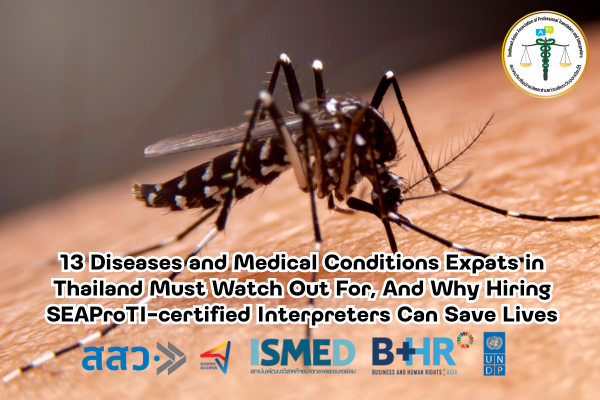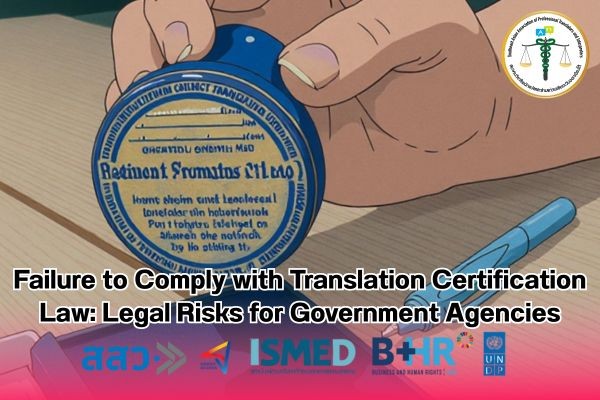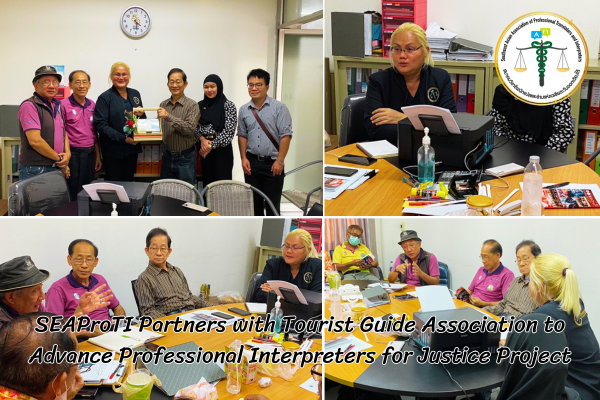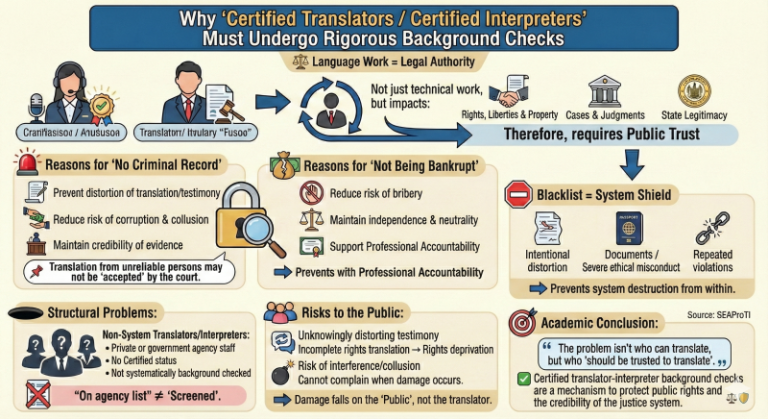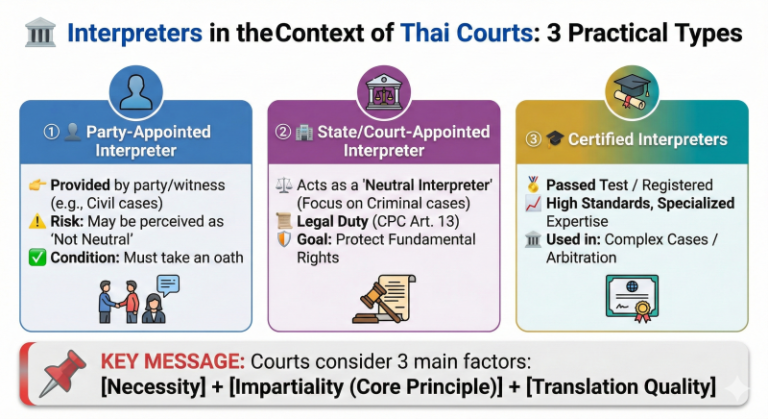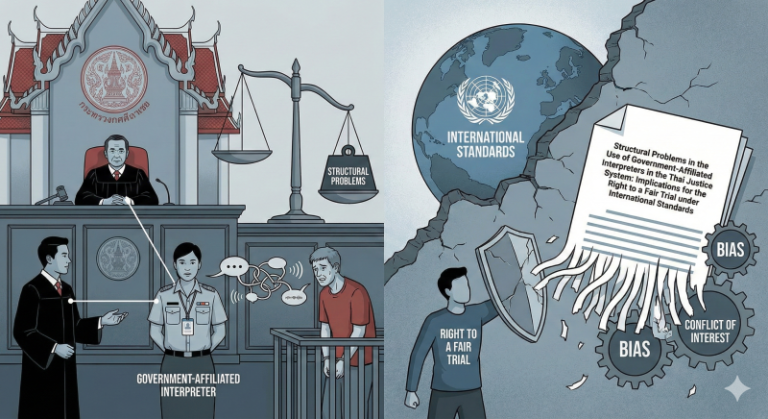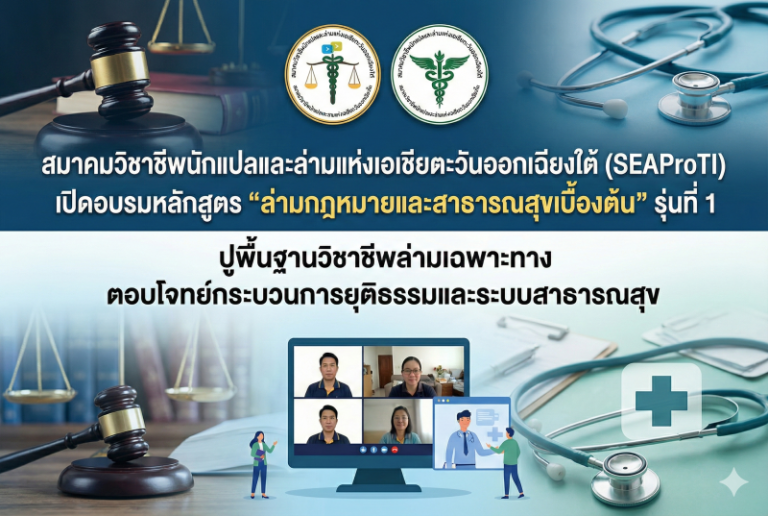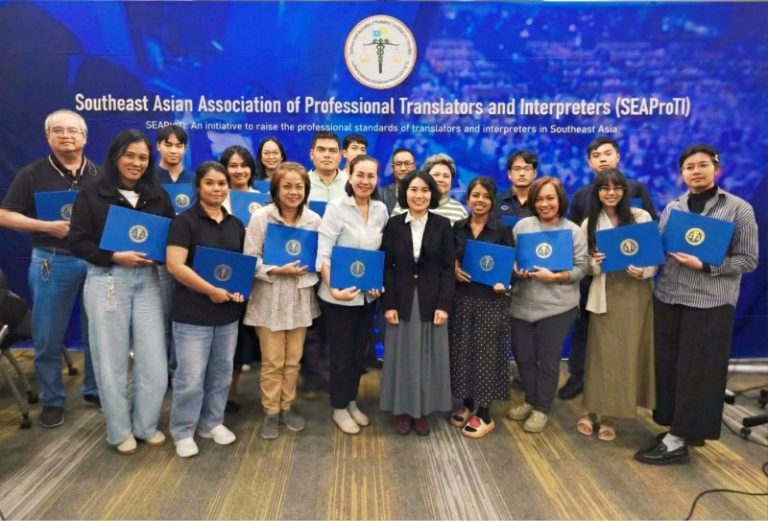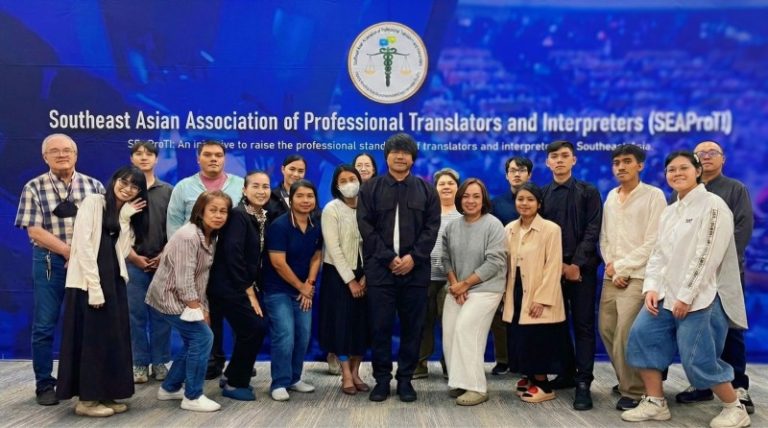13 Diseases and Medical Conditions Expats in Thailand Must Watch Out For, And Why Hiring SEAProTI-certified Interpreters Can Save Lives
29 April 2025, Bangkok – When moving to Thailand, expats must not only adapt to a new culture but also be vigilant about their health. Thailand’s tropical climate and regional healthcare challenges make it crucial to stay informed about infectious diseases.
To ensure clear communication during medical emergencies, working with SEAProTI-certified interpreters — professional language experts certified by the Southeast Asian Association of Professional Translators and Interpreters — can make a critical difference in ensuring your symptoms, history, and needs are accurately conveyed.
Here are the top 13 diseases and health risks to be aware of, and how to protect yourself:
1. Dengue Fever
- Transmission: Spread by daytime-active Aedes mosquitoes.
- Symptoms: High fever, headache, joint pain, rash.
- Prevention: Use mosquito repellent, wear protective clothing, and eliminate standing water.
Why a SEAProTI Interpreter Matters: In hospitals, explaining subtle symptoms like eye pain or rashes to Thai doctors precisely could mean early intervention versus a medical crisis.
2. Malaria
- Transmission: Spread by Anopheles mosquitoes, active at dusk and dawn.
- Symptoms: Fever, chills, headaches.
- Prevention: Mosquito repellents, bed nets, and antimalarial drugs for high-risk areas.
Interpreter Tip: Accurate communication can speed up urgent malaria testing and drug administration.
3. Chikungunya
- Transmission: Daytime Aedes mosquito bites.
- Symptoms: High fever, joint pain, rash.
- Prevention: Similar mosquito-avoidance strategies for Dengue.
4. HIV/AIDS
- Transmission: Unprotected sex, shared needles, and childbirth.
- Symptoms: Flu-like symptoms initially; immune system degradation over time.
- Prevention: Safe sex, regular testing, and avoiding needle sharing.
Interpreter Tip: Sensitive topics like HIV diagnosis require confidentiality and precise language, which SEAProTI interpreters are trained to handle ethically and professionally.
5. Hepatitis A & B
- Transmission: Contaminated food/water (Hep A) and body fluids (Hep B).
- Symptoms: Jaundice, nausea, fatigue.
- Prevention: Vaccination, safe food practices, and protected sex.
6. Zika Virus
- Transmission: Mosquitoes, sexual contact, and pregnancy-related transmission.
- Symptoms: Fever, rash, joint pain, red eyes.
- Prevention: Mosquito precautions; pregnant women should be especially cautious.
7. Typhoid Fever
- Transmission: Contaminated food/water.
- Symptoms: High fever, abdominal pain, diarrhea, or constipation.
- Prevention: Vaccination, hygiene, and safe eating.
8. Japanese Encephalitis
- Transmission: Night-biting Culex mosquitoes, particularly in rural areas.
- Symptoms: Fever, confusion, coma.
- Prevention: Vaccination, mosquito control.
Interpreter Tip: When seconds count during brain-related infections, a SEAProTI interpreter can immediately bridge language gaps, aiding faster diagnosis.
9. Rabies
- Transmission: Bites/scratches from infected animals.
- Symptoms: Fever, confusion, paralysis.
- Prevention: Avoid stray animals, vaccinate pets, immediate wound care after exposure.
10. Leptospirosis
- Transmission: Contact with infected animal urine, especially in floods or farming areas.
- Symptoms: Fever, muscle pain, jaundice, and kidney failure.
- Prevention: Protective gear, avoiding contaminated water.
11. Food Poisoning
- Transmission: Consuming contaminated food or water.
- Symptoms: Abdominal pain, diarrhea, vomiting.
- Prevention: Eat freshly cooked foods, use bottled water, and practice hand hygiene.
12. Respiratory Illnesses (Flu, Pneumonia, ARDS)
- Transmission: Respiratory droplets, surface contact.
- Symptoms: Coughing, fever, fatigue, shortness of breath.
- Prevention: Masks, handwashing, vaccinations.
13. Hand, Foot, and Mouth Disease (HFMD)
- Transmission: Direct contact with secretions, contaminated surfaces.
- Symptoms: Fever, painful mouth sores, rash on hands and feet.
- Prevention: Good hygiene, avoiding infected individuals.
Why Hiring SEAProTI-Certified Interpreters is Essential for Expats’ Health in Thailand
When facing medical emergencies, language barriers can cost lives. Expats often find that hospital staff, although professional, may not be fluent in English, especially in rural hospitals.
Here’s why SEAProTI-certified interpreters are vital:
- Accuracy in Medical Settings: Certified interpreters are trained in medical terminology, ensuring your symptoms, allergies, and history are accurately communicated.
- Confidentiality: SEAProTI-certified professionals adhere to strict ethical codes, protecting your privacy.
- Certified and Reliable: Unlike casual interpreters, SEAProTI-certified interpreters are vetted and uphold recognized international standards.
- On-Demand Support: Many SEAProTI interpreters are available for emergency call-outs, remote video interpreting, or in-hospital support.
- Multilingual Advantage: Whether you speak English, French, German, Japanese, Korean, or Mandarin, SEAProTI members cover a wide range of languages and dialects.
- Tip for Expats: Always have a list of emergency interpreter contacts ready, especially if you travel to rural provinces!
Conclusion: Stay Safe, Stay Covered
- Protect Yourself: Vaccinate, practice good hygiene, use mosquito repellents, and eat safely.
- Hire the Right Help: Rely on SEAProTI-certified interpreters for medical visits to ensure your voice is heard and your needs are understood.
- Secure Insurance: Health insurance with evacuation and repatriation coverage is crucial for expats living in Thailand.
Need help finding a SEAProTI-certified interpreter or a trusted health insurance provider? Contact us today to get personalized assistance and stay protected during your time in the Land of Smiles.
SEAProTI’s certified translators, translation certification providers, and certified interpreters:
The Southeast Asian Association of Professional Translators and Interpreters (SEAProTI) has officially announced the criteria and qualifications for individuals to register as “Certified Translators,” “Translation Certification Providers,” and “Certified Interpreters” under the association’s regulations. These guidelines are detailed in Sections 9 and 10 of the Royal Thai Government Gazette, issued by the Secretariat of the Cabinet under the Office of the Prime Minister of the Kingdom of Thailand, dated July 25, 2024, Volume 141, Part 66 Ng, Page 100.
To read the full publication, visit: the Royal Thai Government Gazette
13 โรคและปัญหาสุขภาพในประเทศไทยที่ชาวต่างชาติควรระวังและเหตุผลที่ควรใช้บริการล่ามรับรอง SEAProTI
29 เมษายน 2568, กรุงเทพ – การย้ายมาอยู่ประเทศไทยไม่เพียงแต่ต้องปรับตัวกับวัฒนธรรมใหม่ ๆ เท่านั้น แต่ยังต้องใส่ใจเรื่องสุขภาพอย่างมาก เนื่องจากสภาพอากาศแบบร้อนชื้นและปัจจัยเฉพาะด้านสาธารณสุขในไทย
เพื่อให้การสื่อสารในสถานพยาบาลแม่นยำและปลอดภัย การใช้บริการ ล่ามที่ได้รับการรับรองจากสมาคมวิชาชีพนักแปลและล่ามแห่งเอเชียตะวันออกเฉียงใต้ (SEAProTI) จะช่วยให้คุณมั่นใจว่าความต้องการทางการแพทย์และอาการของคุณจะถูกถ่ายทอดอย่างถูกต้อง
ต่อไปนี้คือ 13 โรคและความเสี่ยงด้านสุขภาพ ที่ชาวต่างชาติควรรู้ พร้อมแนวทางป้องกัน:
1. ไข้เดงกี (Dengue Fever)
- การแพร่เชื้อ: ยุงลายกัดในเวลากลางวัน
- อาการ: ไข้สูง ปวดศีรษะ ปวดตามข้อ มีผื่น
- การป้องกัน: ใช้ยากันยุง สวมเสื้อแขนยาว กำจัดแหล่งน้ำนิ่ง
ทำไมต้องใช้ล่าม SEAProTI: อธิบายอาการเช่น “ปวดหลังตา” หรือ “ผื่นที่ผิวหนัง” อย่างถูกต้องกับแพทย์ไทย ช่วยให้วินิจฉัยได้รวดเร็วและแม่นยำ
2. มาลาเรีย (Malaria)
- การแพร่เชื้อ: ยุงก้นปล่องกัดช่วงกลางคืน
- อาการ: ไข้ หนาวสั่น ปวดหัว
- การป้องกัน: ยากันยุง มุ้งนอน ยาต้านมาลาเรียหากจำเป็น
ทำไมต้องมีล่าม: เพื่อช่วยให้คุณเข้ารับการตรวจเลือดและรับยาต้านมาลาเรียอย่างทันท่วงที
3. ชิคุนกุนยา (Chikungunya)
- การแพร่เชื้อ: ยุงลายกัด
- อาการ: ไข้สูง ปวดข้อ มีผื่น
- การป้องกัน: หลีกเลี่ยงการถูกยุงกัด
4. เอชไอวี (HIV/AIDS)
- การแพร่เชื้อ: เพศสัมพันธ์ไม่ป้องกัน, เข็มฉีดยา, คลอดบุตร
- อาการ: ไข้ เจ็บคอ ปวดเมื่อยตามตัว
- การป้องกัน: ใช้ถุงยางอนามัย ตรวจ HIV สม่ำเสมอ
ทำไมล่าม SEAProTI สำคัญ: เรื่องสุขภาพที่ละเอียดอ่อนเช่น HIV ต้องอาศัยล่ามมืออาชีพที่รักษาความลับและแปลอย่างแม่นยำ
5. ไวรัสตับอักเสบเอ และบี (Hepatitis A & B)
- การแพร่เชื้อ: อาหาร น้ำไม่สะอาด (A), สารคัดหลั่ง (B)
- อาการ: ตัวเหลือง อ่อนเพลีย คลื่นไส้
- การป้องกัน: รับวัคซีน ล้างมือบ่อย ๆ
6. ไวรัสซิกา (Zika)
- การแพร่เชื้อ: ยุงลาย, เพศสัมพันธ์, ตั้งครรภ์
- อาการ: ไข้ ผื่น ปวดข้อ
- การป้องกัน: ป้องกันยุงกัด
7. ไข้ไทฟอยด์ (Typhoid Fever)
- การแพร่เชื้อ: อาหาร/น้ำปนเปื้อน
- อาการ: ไข้สูง ปวดท้อง ท้องเสีย
- การป้องกัน: รับวัคซีน รักษาความสะอาด
8. ไข้สมองอักเสบเจแปนีส (Japanese Encephalitis)
- การแพร่เชื้อ: ยุงกลางคืนกัด
- อาการ: ไข้สูง สับสน ชัก
- การป้องกัน: วัคซีน, ป้องกันยุงกัด
- ล่ามช่วยอะไร: ในกรณีสมองอักเสบต้องรีบให้ข้อมูลอาการอย่างละเอียดต่อแพทย์ ล่าม SEAProTI จึงช่วยได้มาก
9. โรคพิษสุนัขบ้า (Rabies)
- การแพร่เชื้อ: สัตว์กัด ข่วน
- อาการ: ไข้ อัมพาต สับสน
- การป้องกัน: ฉีดวัคซีนเลี้ยงสัตว์ กำจัดสัตว์จรจัด
10. โรคฉี่หนู (Leptospirosis)
- การแพร่เชื้อ: สัมผัสฉี่สัตว์ติดเชื้อ
- อาการ: ไข้สูง ปวดกล้ามเนื้อ ตัวเหลือง
- การป้องกัน: ใส่อุปกรณ์ป้องกันในพื้นที่เสี่ยง
11. อาหารเป็นพิษ (Food Poisoning)
- การแพร่เชื้อ: อาหาร น้ำปนเปื้อน
- อาการ: ปวดท้อง ท้องเสีย อาเจียน
- การป้องกัน: กินอาหารสะอาด เลือกร้านที่น่าเชื่อถือ
12. โรคทางเดินหายใจ (Respiratory Illnesses)
- การแพร่เชื้อ: ไอ จาม, พื้นผิวปนเปื้อน
- อาการ: ไอ เจ็บคอ ไข้
- การป้องกัน: ล้างมือ ใส่หน้ากากอนามัย รับวัคซีนไข้หวัดใหญ่
13. มือ เท้า ปาก (Hand, Foot, and Mouth Disease – HFMD)
- การแพร่เชื้อ: น้ำลาย น้ำจากตุ่มพอง
- อาการ: ไข้ เจ็บปาก ผื่นที่มือเท้า
- การป้องกัน: ล้างมือบ่อย ๆ ฆ่าเชื้อสิ่งของ
ทำไมต้องใช้ล่ามรับรองจาก SEAProTI ในสถานการณ์สุขภาพฉุกเฉิน
การเข้าใจผิดเพียงเล็กน้อย อาจทำให้การรักษาผิดพลาดได้!
การใช้ ล่ามที่ได้รับการรับรองจาก SEAProTI มีข้อดีดังนี้:
- แปลคำศัพท์แพทย์แม่นยำ: ช่วยสื่อสารอาการโรคต่าง ๆ ได้ชัดเจน
- รักษาความลับผู้ป่วย: ปฏิบัติตามจรรยาบรรณวิชาชีพ
- รับรองคุณภาพมาตรฐานสากล: ผ่านการอบรมและประเมินผลตามมาตรฐานสูงสุด
- พร้อมบริการฉุกเฉิน: ทั้งแปลหน้างาน แปลทางไกล หรือไปโรงพยาบาลด้วย
- สื่อสารได้หลายภาษา: อังกฤษ, ฝรั่งเศส, เยอรมัน, ญี่ปุ่น, เกาหลี, จีนกลาง ฯลฯ
- เคล็ดลับสำหรับชาวต่างชาติ: พกเบอร์โทรศัพท์ล่ามรับรองไว้เผื่อฉุกเฉินทุกครั้งที่เดินทาง!
สรุป: ปกป้องตัวเองและวางแผนล่วงหน้า
- ป้องกันก่อนเกิดโรค: ฉีดวัคซีน กินอาหารสะอาด ใช้มุ้ง และยากันยุง
- สื่อสารอย่างมืออาชีพ: ใช้บริการล่าม SEAProTI เพื่อความปลอดภัย
- วางแผนประกันสุขภาพ: ควรมีประกันที่ครอบคลุมการรักษาและส่งตัวกลับประเทศในกรณีฉุกเฉิน
ต้องการหา ล่าม SEAProTI หรือที่ปรึกษาประกันสุขภาพ ที่เหมาะสม? ติดต่อเราได้เลยเพื่อรับคำแนะนำฟรี ไม่มีค่าใช้จ่ายเพิ่มเติม!
เกี่ยวกับนักแปลรับรอง ผู้รับรองการแปล และล่ามรับรองของสมาคมวิชาชีพนักแปลและล่ามแห่งเอเชียตะวันออกเฉียงใต้
สมาคมวิชาชีพนักแปลและล่ามแห่งเอเชียตะวันออกเฉียงใต้ (SEAProTI) ได้ประกาศหลักเกณฑ์และคุณสมบัติผู้ที่ขึ้นทะเบียนเป็น “นักแปลรับรอง (Certified Translators) และผู้รับรองการแปล (Translation Certification Providers) และล่ามรับรอง (Certified Interpreters)” ของสมาคม หมวดที่ 9 และหมวดที่ 10 ในราชกิจจานุเบกษา ของสำนักเลขาธิการคณะรัฐมนตรี ในสำนักนายกรัฐมนตรี แห่งราชอาณาจักรไทย ลงวันที่ 25 ก.ค. 2567 เล่มที่ 141 ตอนที่ 66 ง หน้า 100 อ่านฉบับเต็มได้ที่: นักแปลรับรอง ผู้รับรองการแปล และล่ามรับรอง


